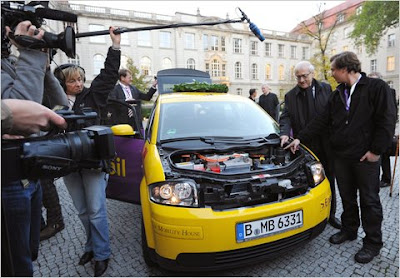
Original Article:
http://www.treehugger.com/files/2011/02/population-growth-ecological-footprint-about-equity-environment-collapse.php?campaign=daily_nlSnippets:
As it stands now, 500 million people on the planet (about 7% of the world population) is responsible for 50% of all CO2 emissions. At the other end of the scale, the bottom 3 billion people are responsible for just 6% of the total. The United States leads the world, with its 5% of world population roughly responsible for one-third of all global expenditures on goods and services.
If that level of resource consumption was extended globally, the planet could support just 1.4 billion people.
To equitably support current population levels and not continue to degrade the ability of the planet to support us, we'd all have to live like the average person in Thailand or Jordan--roughly $5,000 a year's worth of consumption.
And remember that population growth is expected to continue until we hit about 9 billion people (or perhaps more, if recent UN warnings bear out). Which means that the global resource pie gets sliced into even smaller and smaller equal pieces--or relatively equal at least, I'm not advocating absolute equality as the ideal.
The hard part of this should be obvious if we hold on to equity as a virtue (and make no mistake I think we should): If a minority of the world's people consume the vast majority of the world's resources, doing so ecologically unsustainably, and there's a large group of people claiming a right to have what that minority do, a recipe for collapse is quickly created.
Beyond the usual (and valid) suggestions of increasing women's education and reproductive freedom, creating more gender equity, and lifting people out of absolute poverty, there are several things to do that may be able to prevent this both concrete and conceptual:
Greater Efficiency Can Help, But Not Solve This ProblemEfficiency and waste. Improving the former and reducing the latter can certainly help everyone do more with less resource consumption. Will it make up for the fact that the ecological footprint of the average citizen in the United States is roughly four times the carrying capacity of the planet and even that of the average person in China is unsustainable as well? Probably not, but both are critically important.
Until Environmental Damage Is Incorporated Into Economics We Will Continue Making Bad ChoicesStart measuring more than GDP, incorporating well-being and environmental factors (like depleting natural capital), and reporting this as the baseline of national worth. Plenty of more articulate people than I have written extensively on alternate economic indicators such as the Genuine Progress Indicator.
'Developed' Is A Bad Term For What Industrial Nations AreGetting rid of the terms 'developed' and 'developing' as applied to nations. Even 'emerging economy' is problematic. Developed and developing signify complete in some way or being in the process of reaching completeness. Emerging is a variation on this. All imply inherent goodness in consuming resources like those of us in the US, in Europe, Japan, Australia, etc etc etc do, when in fact ecologically speaking that level of consumption extended globally is a disaster in the making.
Continued Idealization of Economic Growth Is DelusionGoing along with this is moving our expectations and language away from growth economics to steady-state economics. We have been so indoctrinated with the notion that growth is good always that this may be difficult, but given what we now know about the ecological limits of the planet and how in the highest consuming nations of the world any growth is likely uneconomic, to not cease talking about economic growth as an unqualified good thing is just delusional.
We Have to Be Able to Calmly Talk About Population Growth & Resource ConsumptionBreak the taboo on talking about population growth as somehow an infringement on personal liberty...If we cannot even have a nuanced discussion of the relation of how our personal reproductive choices, the group reproductive choices of nations, as well as how our individual and collective consumer choices combine into environmental and social impact, we will surely choose the to continue down the path of collapse.


